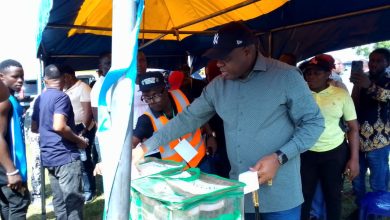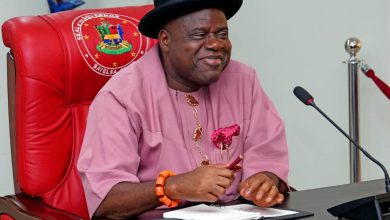Restructuring in Whose Interest?

Restructuring in Whose Interest?
By Thomas Peretu
It is true that there is a groundswell restructuring sentiment acutely canvassed by a cross section of the country. The rising agitation for reconfiguring and re-engineering of the nation to accommodate the growing diversity as well as the demographic dispersal of the populace underpins the public discontent against the present lopsided political arrangement.
The volley of voices attracted to the fray have over the years enlarged the field of discourse as a result of the apparent marginalisation, underdevelopment, neglect and inequities suffered by a section of the people due in part to the suffocation of the socio-political space.
The hegemonic template of the ruling class, the malfeasance and the blight in the governance process together conspire to subjugate the rights of the people The obvious effect of this misrule though silently endured over a long period by the passive majority provide a good ground for the dissent and commove for the liberalisation of our democratic experiment. These negative tendencies promoted by a the privileged few is the albatross around the neck of our progress as a country.
Restructuring, therefore is borne out of the desire to wrest power from the few who control our collective destiny. The masses shut out of the common wealth of the nation by reasons of religion, place of birth and other narrow inconsequential considerations are beginning to assert their equality and the right to the common patrimony of the country.
The word, restructuring has become a seductive catch phrase for all manner of political demands for a better life. Sad to note that restructuring is now open to varied interpretations depending on the individual’s whims and caprice.. Hence, restructuring means different things to different people. Unfortunately, I dare to reiterate that the word has been skinned of its full effect—verve and potency.
What then is restructuring?
The Oxford Advance Learner’s Dictionary defines Restructure to mean “to organise something or a system or company in a new and different way.” Good, but it is more than that in my opinion.
The Encarta World English Dictionary in its own definition says, “to change the way in which something is organised or arranged” (2) “reorganise a debt” …to alter the terms of a loan…
This sounds okay but lacks the bite that I desire in a definition.
On its part Wikipedia defines Restructuring as “The corporate management term for the act of organising the legal, ownership, operational, or other structures of a company for the purpose of making it more profitable, or better organised for its present needs.” Excellent.
Wikipedia eloquently captures the essence and purpose of our struggle for restruring of our nation, even though Wikipedia’s emphasis is on corporate restruring but it fits squarely into our case as a country. Any restructuring agenda that does not put into consideration all the ingredients outlined by Wikipedia is a mockery of the concept.
Quite a number of elites who are beneficiaries of the present stultified arrangement have either ignored or discountenanced the call for change in our political culture. The authors of the present social malaise have also come up with a perverted version of restructuring. And that is very disturbing to say the least. They think the establishment of local or state police is good enough to assume the status of a revamped polity. What a wrong notion?
Long before restruring became the sweet refrain on the lips of Nigerians, our people, I mean the leadership of Ijaw nation have always articulated the need to renegotiate our corporate existence as a nation. Their position is understandable having being at the receiving end of official hatred perpetrated by the federal government in the last 60 years. Perhaps, they are oblivious of the fact that the Niger Delta region lays the golden egg that feeds the country as its major cash cow.
If restructuring is that important and necessary, why is a section of the country, specifically the core North is so consumed by such a morbid fear of the good intention of rejigging the nation. Why? Except one is feeding fat from this gargantuan malady, otherwise why would anyone in his right frame of mind object to revamping the system?
As it stands, there is a need for all the stakeholders in the Nigeria project to renegotiate the corporate existence of this country, as we did in 2014 under President Jonathan’s constitutional conference initiative. Even though he could not summon the political will to implement the far reaching recommendations of the people. That was one good opportunity at reshaping the political fortune of this country that we squandered at the altar of a presidential election. We can not obviate from a peaceful dialogue, if we are to continue this relationship.
I recall a few months ago that the leadership of the Arewa Peoples Congress, or some northern elders forum shouted down the Vice President, Yomi Osibajo for daring to acknowledge that there is a crack in the polity, hence proffered restructuring as a possible solution. The erudite lawyer was courageous enough to point the way forward. And that is commendable.
Interestingly, the people of the south and their middle belt counterparts under the aegis of the Southern and Middle Belt Leaders Forum rose recent from its usual meetings and agreed thus: “We make it abundantly clear to our colleagues in the core North that yesterday ended last night,, and never again shall this country be same old way. No section of this country can play any supremacist role again as if the rest of us are fools.”
Then the group went further to give a caveat stating clearly that “It is either we live together as equals under the same rules of engagement or we explore other options as dignified human beings.” These are very weghty words to utter at this critical times of our nation. These respected leaders are not known to be frivolous with words. The must have considered the consequencies of their utterances before releasing the communique.
The Ijaw nation have always canvassed for resource control, in other words every resource–solid or liquid found or discovered underneat the land in any particular location should belong absolutely to the people where such discovery is made. That obviously renders the Land Use Act of 1978 ineffective. They asked that the obnoxious Act should be repealed.
In my view, the clamour for restructuring should include but not limited to the devolution of power from the centre to the federating units. It is wrong and politically incorrect to concentrate so much power at the centre while the units which generate the resources to run the government are left hanging in the balance.
Issues such as national defence, foreign affairs, international trade, customs and excise, power generation and the police administration should remain within the purview of the exclusive legislative list while others should be transferred to the concurrent or residual legislative list in the constitution.
Because of the inadequacies of the 1999 constitution, I also advise that that the document should be subjected to total overhaul in line with current realities of the country. The constitution in its opening statement lied by assuming that “we the people” constructed the letters of the constitution. That is far from the truth. The 1999 constitution is a product of the military which was handed down to us by a military fiat.
Other matters that need to be tinkered with include fiscal fedederalism or true federalism, the federal allocation formular and the creation and autonomy of local government system should form the basis of the restructuring agenda.
Another very saliet issue that calls for urgent attention is the need to convert the current national assembly to a part time assemblage of law makers. If the truth must be told, the federal government is ill-equipped to shoulder the enormous financial recklesness of the legislative arm of government in the face of our dwindling revenue sources. We certainly cannot continue to underwrite the bogus expenditure of our legislators whose salaries and allowances remain opaque and inaccessible. How can we sustain the large appetite of our law makers? It is preposterous to think that any reasonable government will subscribe to the fleece in the national assembly especially in the light of recent revelations.
The checks and balances provision in the constitution must be made real and so that each arm of government– the Judiciary, the Executive and the Legislature, would be more responsive to the yearings and aspirations of the people.
At this point, I would like to join voices to the chorus of restructuring because the time is ripe for us to reevaluate our union so as to be better placed to confront the challenges of the future. It is time we forge a common ground as one united, indivisible entity under the service and rulership of God.
In conclusion, may i restate the lofty ideals espoused by Shehu Usmanu Dan Fodio in his book, ‘Bayan Wujub al-Hijra’ and I quote: “One of the swiftest ways of destroying a State is to give preference to one particular tribe over another or show favour to one group of people rather than another.” Our country is without doubt a breeding ground for injustice, nepotism, corruption, wicked manipulation of the masses by the privileged few despite the good counsel of the Islamic scholar, Usmanu Dan Fodio.
This is the bane of our country, and this is the time to put in place the right machinery to heal the land of all evils including police brutality. The quest for restructuring is a legitimate desire for a better society where justice, equity and firness is given its rightful place in determining the affairs of men.
This is my stand.
Thomas Ebikabowei Peretu is a social commentator and political analyst






